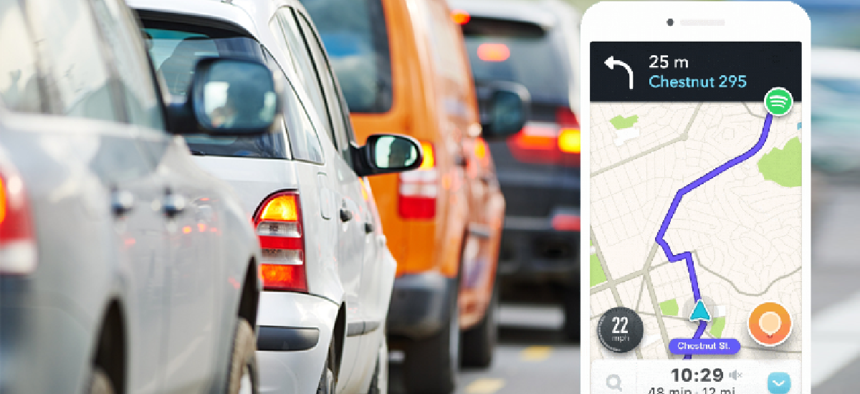Connecting state and local government leaders
Under the Connected Citizens Program, participating cities and states get filtered data based on aggregated traffic information Waze collects from their communities of drivers.
It didn’t take long for Waze to get a foothold in the transportation space. The company launched in 2009 and today boasts millions of drivers who use the community-based GPS navigation app to help get them from point A to point B, notify them of speed traps and avoid traffic jams.
It also didn’t take long for cities to take notice and ask for a peek at the traffic insights Waze was amassing. Thais Blumenthal de Moraes, the global lead of the Waze Connected Citizens Program, told GCN that the partnerships between cities and Waze all started with Rio de Janeiro in the run-up to the 2016 summer Olympics when the city wanted insight on where to build infrastructure to support the games.
“The mayor asked us if it would be okay for him to have access to our data for his operations,” Blumenthal de Moraes said. Today, more than 800 cities participate in its CCP, including transportation departments, emergency management agencies and public-sector analytics teams.
Under the partnership participating cities and states get filtered data based on aggregated traffic information Waze collects from their communities of drivers. The feed is updated every two minutes, which lets transportation officials see and analyze what's happening on their roadways – backups, accidents, potholes and even roadkill – in near-real time. When cities share construction or road-closure data with Waze, the app pushes that information to drivers in real time, reroutes traffic and minimizes the impact of incidents or events that affect traffic.
Waze considers CCP a real partnership because the data goes two ways. Cities get access to a private feed of Waze data, and Waze gets incident and road closure data that improves the usefulness of the app for users.
Philadelphia took advantage of the data exchange to reduce traffic when the Pope visited in 2015, alerting 320,000 Waze users of road closures, Blumenthal de Moraes said.
“They reported back to us that compared to the same weekend the year before, when they also had a big event come through, they actually had a 20 percent decrease in congestion just because people were informed and knew where to go,” she said.
The data Waze provides to cities isn’t accessible through a public API. The cities apply to be a part of the program and are given access to an XML or JSON feed that can be ingested into their operations. On the other end, Waze provides cities with specifications on how to send it information or road closures or other information.
“We understand there are a lot of partners who don’t have the technical ability to create [or accept] feeds … so we do have some tools available for our partners that are web-based, so they can start looking at data for their region without any development,” Blumenthal de Moraes said.
The company's Traffic View Tool allows cities to monitor specific routes, send traffic alerts, report incidents and edit road closures.
To join CCP, cities sign terms and conditions that say they’ll never make the data publicly available. And the data Waze does provide is anonymized without any user information attached.
Carlos M. Braceras, the president of the American Association of State Highway and Transportation Officials and the executive director of the Utah Department of Transportation, mentioned the CCP program in his testimony at a Nov. 28 Senate hearing.
“Under its Connected Citizens Program, there has been increased and ongoing partnership between Waze and various governmental agencies to share publicly available incident and road closure data to facilitate smoother movement of vehicles and people,” Braceras wrote.
This increasing use of data is an important trend in transportation right now, Braceras said, because it can help transportation departments spot “patterns, trends, and associations, especially relating to traffic patterns, human behavior, and interactions.”
The U.S. Department of Transportation has pointed to Waze as a potential provider of transportation data. Dan Morgan, the agency's chief data officer and acting chief technology officer, said at a conference earlier this year that the agency was looking at using Waze as a way to bolster the information it was already collecting.
The Volpe National Transportation Systems Center also conducted a pilot using crash data from Waze and accident information provided by the State of Maryland via the National Highway Traffic Safety Administration’s Electronic Data Transfer pilot. The Volpe Center used machine learning to train models to help predict crashes and found the models provided near-real time, granular estimates of crashes that can help improve safety policy and transportation agency operations.
The pilot was one of the largest predictive analytics projects the company has worked on to date, but others are beginning to show interest in using the data in predictive applications. Rio has collected data on flood points around the city, so now it uses rain indexes to identify what roads are most likely to flood and close them before the traffic backs up.
“The question of simulation and prediction is something we’re going to start seeing more and more,” Blumenthal de Moraes said.



